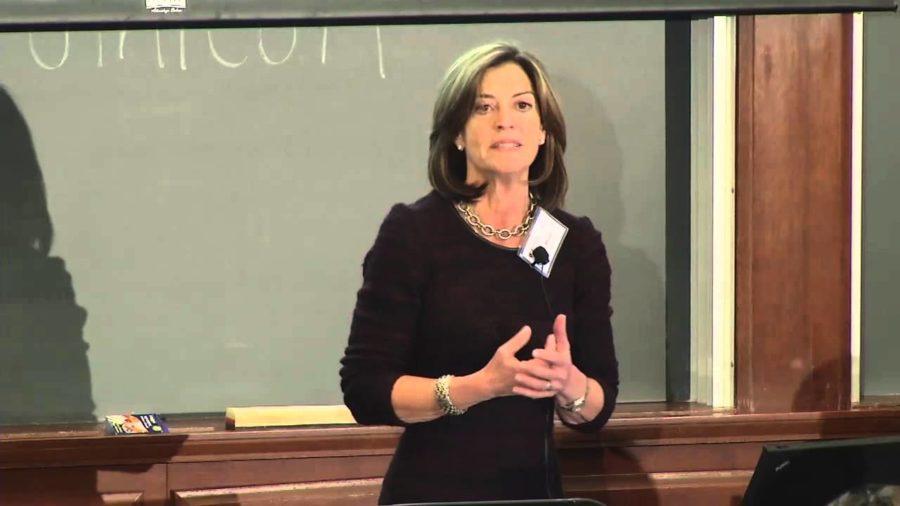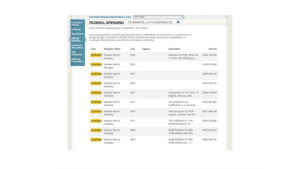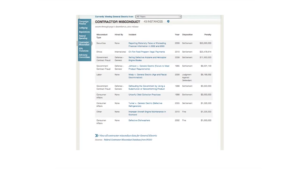Micah Sifry: Our next speaker is Ellen Miller of the Sunlight Foundation and before that Center for Responsive Politics and Public Campaign. She’s been in this business for a very long time.
Ethan says this is nepotism. I don’t think it’s nepotism but there’s clearly a relationship. I’m an advisor to the Sunlight Foundation. Ellen and I are close collaborators. So I’m actually going to kinda start and then hand the ball off to her—
Audience member [Ethan Zuckerman?]: We’ll just call it collaboration.
Sifry: Collaboration, then. It’s a community of interest, not a conflict of interest. Especially if we’re being transparent about it.
So somebody asked earlier today about not truthiness but trustiness and whether we could somehow signal it in clearer ways. And I sort of elbowed Ellen and I said, “Remember that slide we built five years ago when we were trying to convince some potential funders of the Sunlight Foundation of like where we would like to get to eventually?”
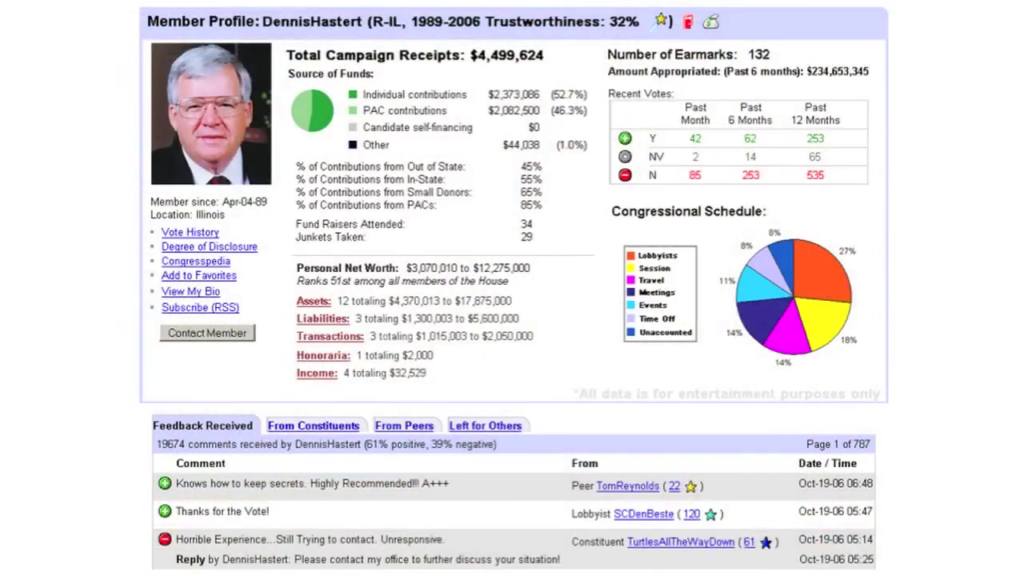
And so this doesn’t exist. This is a mockup. It’s not very good, in that it hasn’t really been designed to look that good. But it gives you an idea of a possible direction where you might be able to get to someday (maybe the hackers tomorrow can be a little inspired by this), of really collecting all the relevant information about a politician and his voting record, his campaign contribution background. Who he’s meeting with in terms of his congressional schedule. What he’s earmarking. What kind of feedback he’s getting from constituents.
Obviously some of this data doesn’t exist, Or if it does it’s dispersed. And some of it does exist. And I think what Ellen is going to do is show us what Sunlight actually is putting together already, and which is hopefully part of this infrastructure of making a stronger immune system. Ellen?
Ellen Miller: Hi everybody. I used chocolate as my caffeine intake a few minutes ago, so I’ve got sugar and caffeine in me. Thanks Micah. In the interest of full disclosure I should tell you that the other co-host of this this panel, Zephyr Teachout, also worked with Sunlight in the early days. In fact, she worked to develop this piece of information, the congressional schedule, which we really have now for about four members of Congress. So we have a ways to go on that.
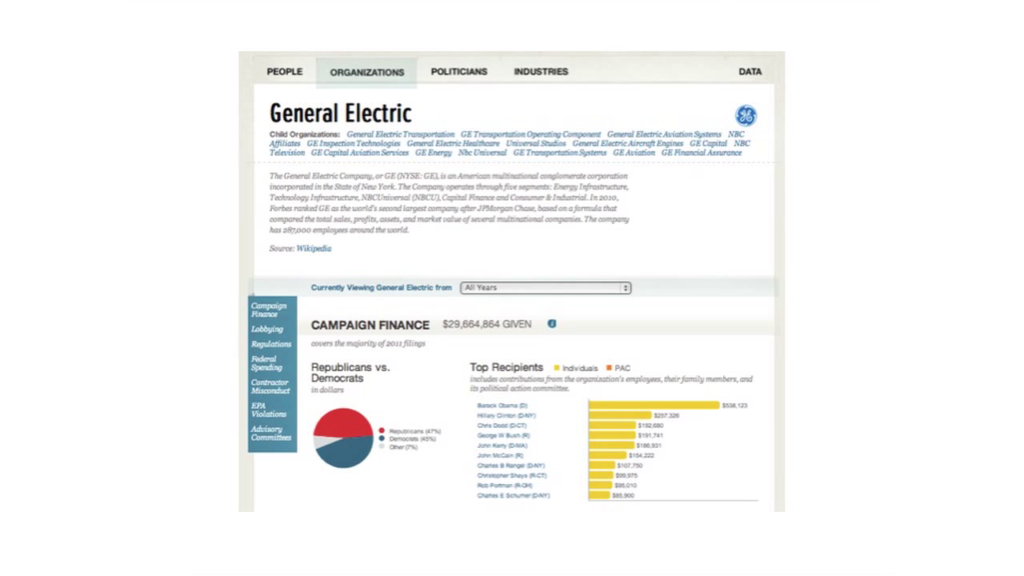
Alright. So I’m going to show you very quickly a couple of things. I’ve long had this fantasy in my entire career, which has mostly been in the field a money and politics, to be able to find one place where you could enter a search term like this one, “General Electric,” and see everything you could find out about a company, a corporate profile—what they do in Washington, what they do at the state level. And Sunlight is moving in that direction. So you would think, and most of you probably know, we have a site and you look at the campaign finance profile of a company like General Electric at the state versus federal level. So that was an accomplishment to actually mash those two data sets together, and the data is provided by our friends at the National Institute on Money in State Politics and the Center for Responsive Politics.
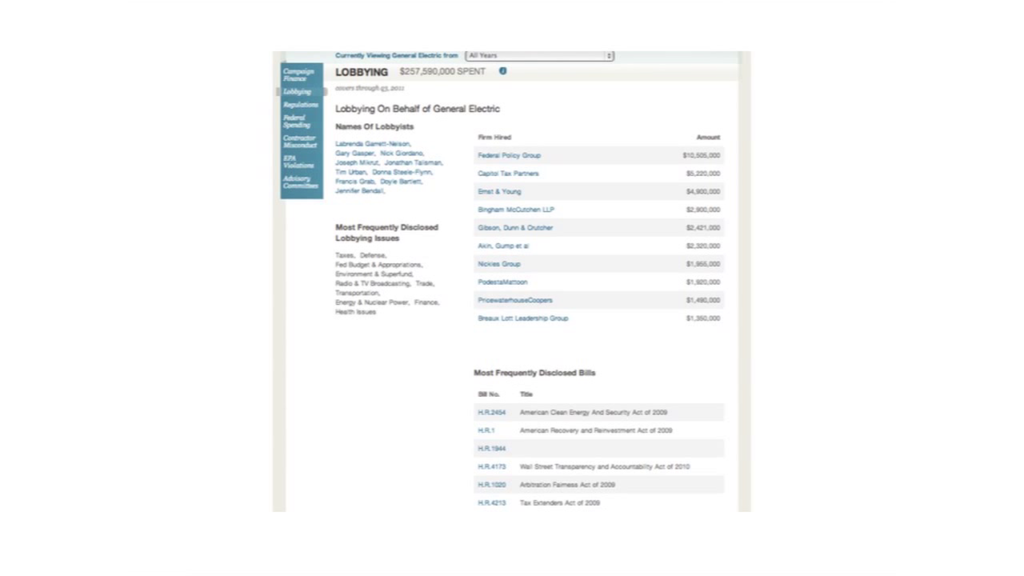
But that’s not enough. That’s the influence industry, right? So what else in the influence industry is important? Lobbying data is important. More money’s spent on lobbying than actually in campaign contributions. So we added this into the same data set. A lot of other stuff that’s really important that shows a corporate profile. So in this software I was talking about earlier that uses natural language processing software, we found that we are able to actually scrape the web site regulations.gov, where all of government (or 89% percent or something of government) puts all of its regulations online and you can comment.
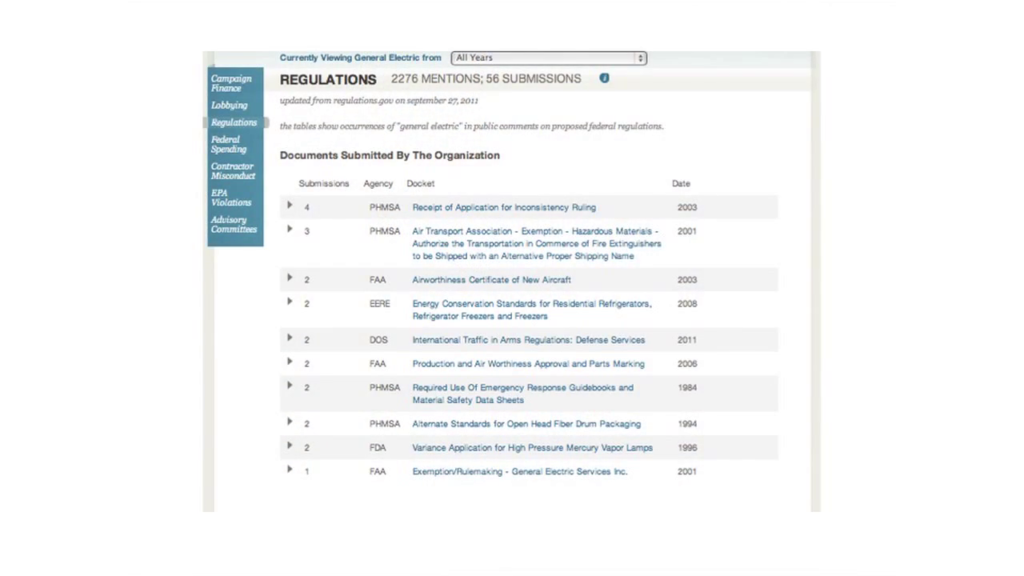
So in this particular search this is still looking at General Electric’s comments on pending rules and regulations. This was a major move forward for us.
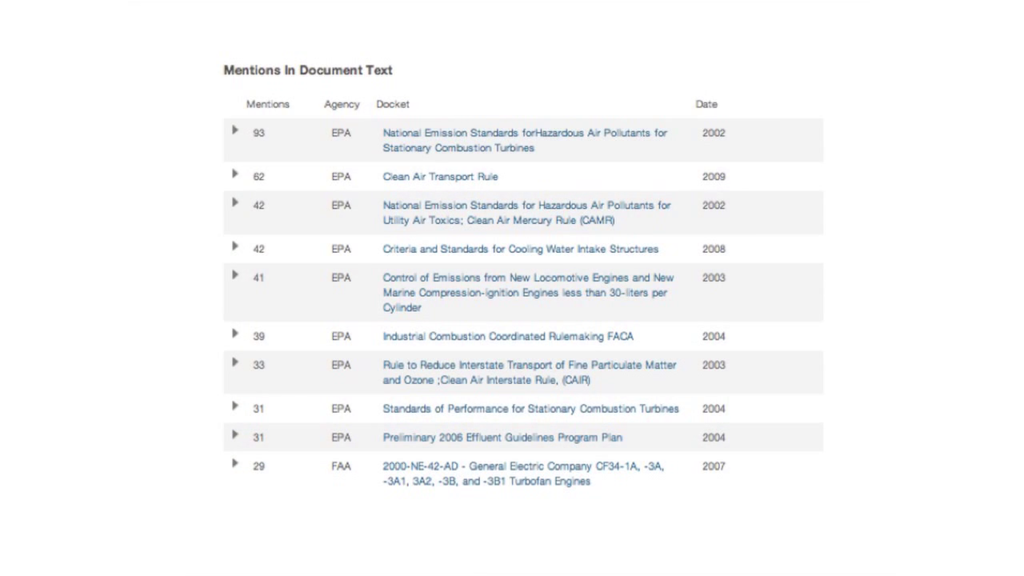
And then we thought, what other data might be relevant to a corporate profile in Washington. We thought well, maybe EPA violations. So we imported— I make it sound so easy. taught me who reported the EPA ECHO database into this. And so here what you have is a list of the times General Electric has been cited by the EPA.
We wondered maybe whether General Electric, or any other corporation, how much they’d received in federal grants or contracts—mostly contracts. There’s that information. We brought that in as well. We wondered if any of these contractors, any of these corporations, had been cited on the contractor misconduct list. The project on government oversight gave us their list of the contractor misconduct database, and that’s incorporated. There’s more on the EPA violations.
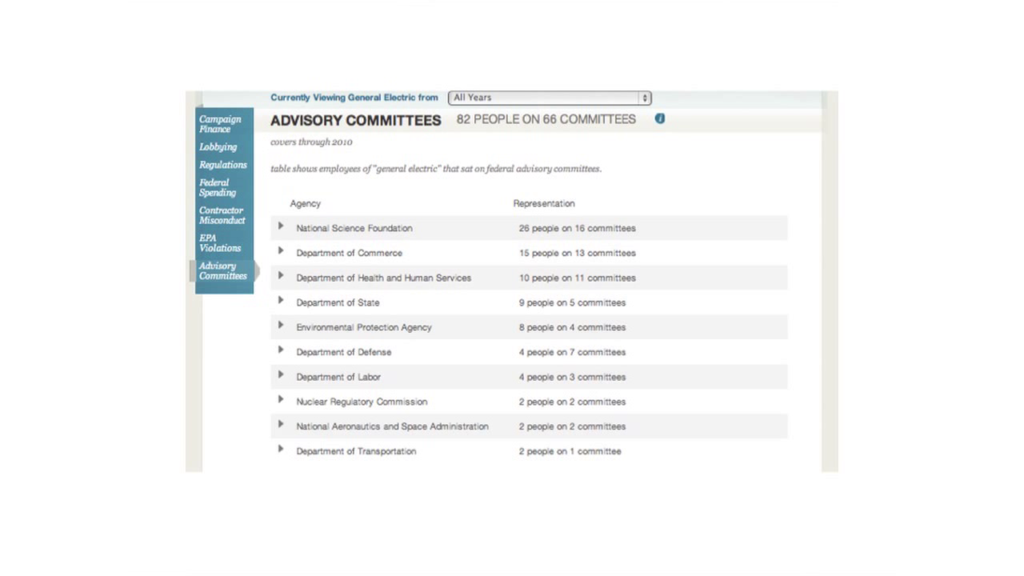
And then there are these things called federal advisory committees. So does anybody from GE sit on a federal advisory committee? Yeah. A lot. So National Science Foundation, twenty-eight people sit on sixteen committees, just from General Electric alone. So you see where we’re going with this. And this data base is designed at least to be infinitely expandable.
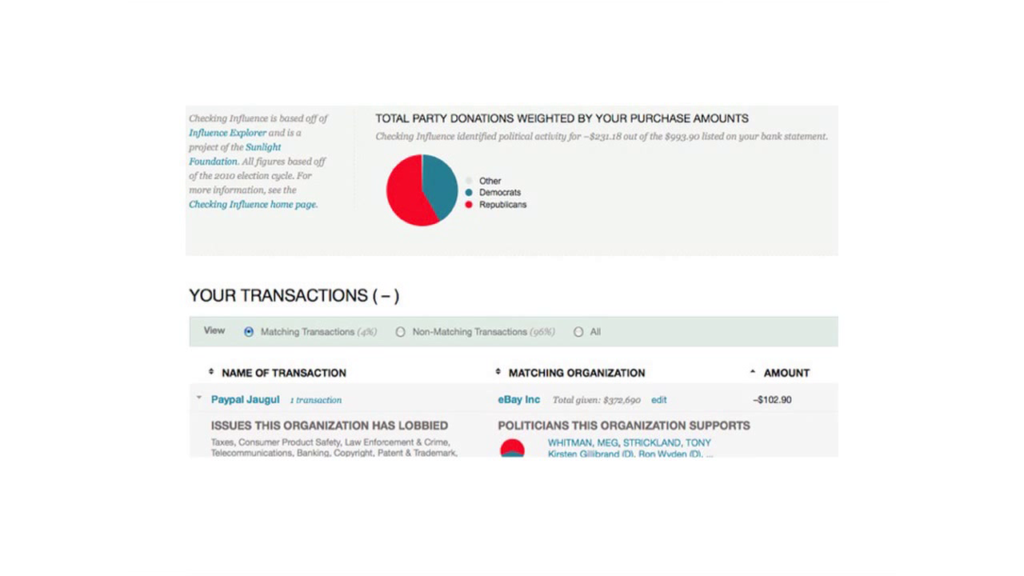
So this next site— Is this Influence Explorer? This is Checking Influence. We really want to take the information out of those large databases, and the first one I showed to you, Influence Explorer, is really something more for a journalist to use. So we built a plugin, which is what this reflects, so that you can up your checking account or your credit card account, and take a look at the entities that you’re doing business with and see whether they’re giving to Democrats or Republicans. Just information you might want to have.
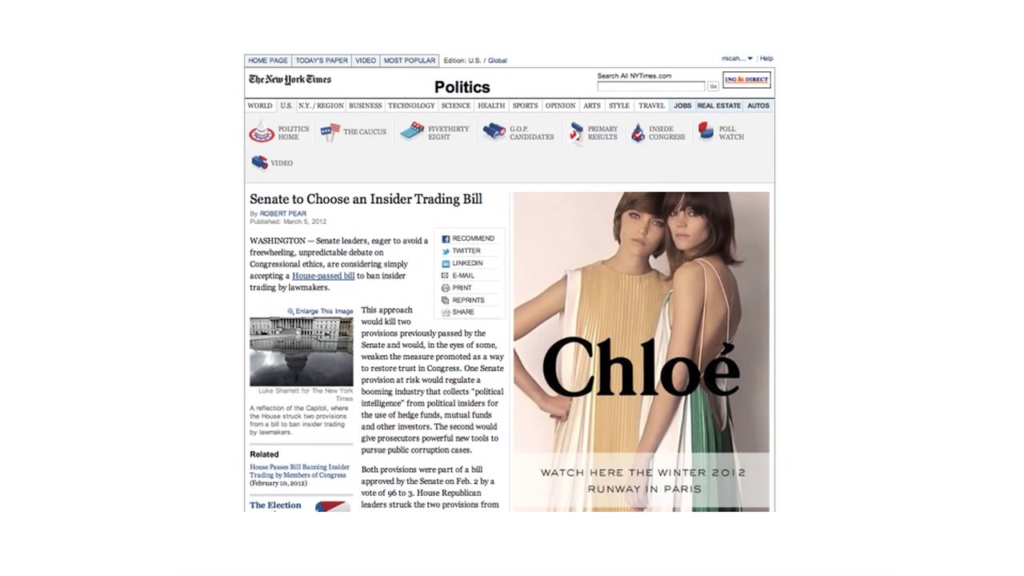
We built another web site called Polygraft, to enable you to filter a news story like this one which appeared in the paper today… Filter it through this enormous influence explorer database, and show you down the right-hand side the connection between the entities mentioned in this news article. And one of my long-time friends, Sheila Kaplan, a long-time investigative reporter said she finds it so very interesting to see the connections that she didn’t even always know were there. And I don’t know if she uses it before she publishes every story, but that is the idea, that journalists and citizens would look to find the story behind the story.
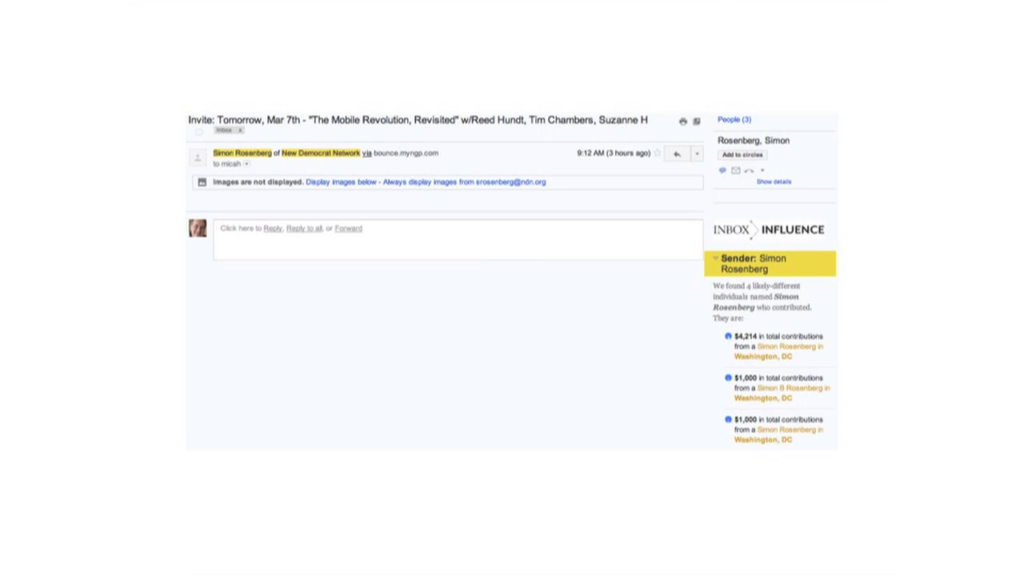
So this is Inbox Influence. So this is same data set. This is a Gmail plugin. You can put it right into your Gmail account. And anyone who sends you an email will be filtered through this enormous same database of Influence Explorer, and you can get an indication on the right-hand side as to whether the person who’s writing you an email has actually made campaign contributions, and how much.
This one actually stopped our office dead in its tracks for about forty-eight hours as we filtered what our friends were sending to us. This is all public information. The idea is to make this information more and more personal, more directly involved with the things that you you are particularly interested in.
This is a detail on this. [slide not shown in recording] This is an email that Micah received this morning. And this is what he found, in detail.
So that’s the last slide that I want to show you. We have a mobile app which is actually in development now, which is a bar code scanner. And the idea is to scan a product, determine which company made that product, and to look at what their campaign contribution profile looks like, for people who are interested. It’s not even in the alpha phase, it’s “can this possibly work” phase, and the jury is still actually out. Except we did scanner Coca-Cola can and it worked on that and it worked on a Dr. Pepper can as well.
So stay tuned, in terms of the kinds of things that we’re able to produce that will make a difference on the streets, and putting this information easily into the hands of people who can now they can use it to to filter and make choices that they’re concerned about. Thanks.
Further Reference
Truthiness in Digital Media event site
